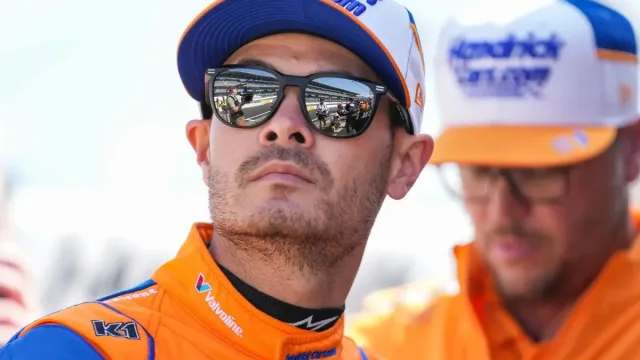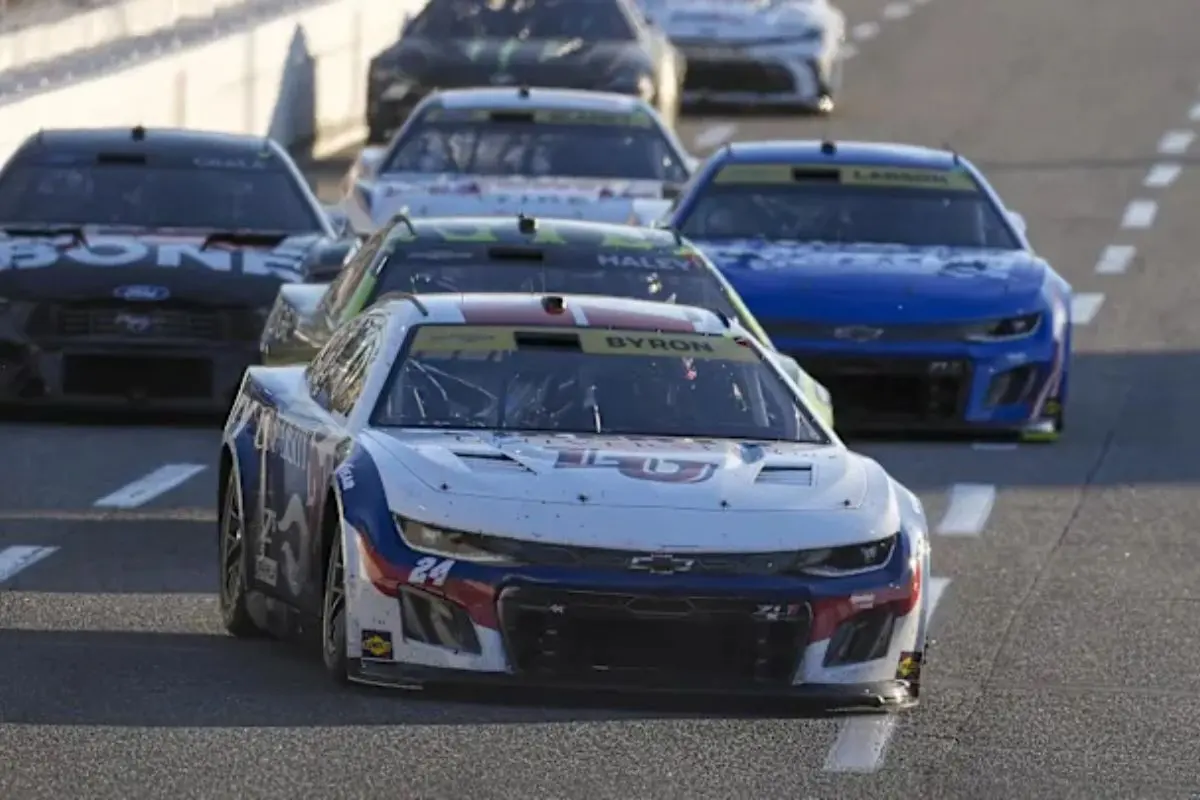Kyle Larson playoff heartbreak linked to Indy 500 decision as he chose to race in the Indy 500 instead of focusing on the Coca-Cola 600. This decision had big consequences for his NASCAR championship hopes. Weather delays at Indy cost him important points during the Coca-Cola 600, which led to him missing the Championship 4 by just seven points. This shows how fragile NASCAR’s playoff system can be, where even small mistakes can have huge effects. Kyle Larson’s situation brings up questions about balancing personal goals and team needs in NASCAR’s evolving format.
Key Highlights
- Kyle Larson missed the NASCAR Championship 4 by just 7 points after a disappointing playoff performance.
- His decision to participate in the Indy 500 conflicted with the Coca-Cola 600, costing him crucial points.
- Weather delays at Indy directly affected his ability to compete and gain points in the NASCAR race.
- Expert opinions indicate that lost points from this decision significantly impacted his NASCAR playoff positioning.
- The current NASCAR playoff format emphasizes sporadic victories, which can overshadow consistent performances like Larson’s six wins.
Kyle Larson’s Disappointment: Falling Short of NASCAR Championship 4
Kyle Larson’s 2024 NASCAR Cup Series campaign concluded in disappointment, as he narrowly missed qualifying for the NASCAR Championship 4 by a mere seven points following a challenging race at Martinsville. This outcome was particularly disheartening for both Larson and his #5 team, who had entered the playoffs with high expectations and a solid foundation of bonus points.
Early in the NASCAR playoff series, Larson displayed formidable speed and skill, suggesting he was a strong contender for the championship. However, crucial moments during key races ultimately hindered his progress. Larson’s performance at Las Vegas and Homestead was lackluster, where he struggled to capitalize on opportunities that could have solidified his advancement.
The strain of the elimination format proved to be a major hurdle, as Larson’s inability to navigate these critical races effectively left him vulnerable. His missteps at these tracks, combined with the intense competition, culminated in a disappointing finish at Martinsville, where a stronger showing could have easily secured his spot in the finale.
This narrow miss has ignited discussions among fans and analysts regarding the impact of Larson’s decisions throughout the season. While his early playoff performances hinted at potential success, the inconsistency in critical moments ultimately defined his experience.
As Larson reflects on his 2024 season, the lessons learned will be invaluable in guiding his future endeavors both on and off the track. The disappointment of falling short serves as a reminder of the thin margins that characterize championship racing in NASCAR.
The Indy 500 Decision: Did It Derail Kyle Larson’s NASCAR Title Hopes?
While many factors contributed to Kyle Larson’s disappointing playoff outcome, his choice to participate in the Indy 500 instead of the Coca-Cola 600 has emerged as an essential decision that may have ultimately derailed his championship aspirations.
This critical moment highlights the complex dynamics faced by drivers balancing personal ambition with team goals.
Key aspects of Larson’s Indy 500 decision include:
- Weather Delays: Larson’s debut was tainted by rain, causing notable disruptions that forced him to remain at the Indianapolis Motor Speedway, rather than returning to Charlotte.
- Missed Points: By the time Larson arrived back in his #5 Chevy, the Coca-Cola 600 had progressed to a point where it was deemed official, resulting in the loss of vital championship points.
- Strategic Implications: The points Larson missed due to this decision were not merely numerical; they represented a loss of momentum that could have propelled him into a more favorable position in the playoffs.
- Expert Opinions: Bubba Wallace’s spotter, Freddie Kraft, emphasized that these lost points were likely the difference between Larson making the NASCAR Championship 4 and falling short, highlighting the weight of this decision.
“Kyle Larson misses the final 4 because of the Indy 500. He missed by seven points. And you don’t think he’s not gonna get any stage points in that race. You know he’s missing the race. We talked about it not coming to bite him, but that’s essentially the difference, in my opinion.” – Freddie Kraft
In the cutthroat environment of NASCAR playoffs, such choices can have lasting repercussions. Larson’s Indy 500 participation, while an admirable pursuit, may ultimately serve as a cautionary tale of how ambition must be carefully weighed against the realities of competitive racing.
The NASCAR Playoff Format: A Double-Edged Sword for NASCAR Drivers
The complexities of Larson’s Indy 500 decision highlight a broader issue within NASCAR—the playoff format itself. The current playoff system has sparked intense debate, particularly following the elimination of consistently high-performing drivers like Larson from the NASCAR Championship 4 in 2024. Critics argue that the format disproportionately favors sporadic victories over sustained excellence, leading to a system that seems random rather than meritocratic.
This duality poses a notable challenge for drivers who aim for championship rivalry. While the excitement of sudden victories adds a layer of unpredictability, it risks alienating those who consistently perform well over the season. As evidenced by the 2024 season, where high performers failed to make the NASCAR Championship 4, the potential disconnect between performance and playoff advancement raises questions about the long-term sustainability of such a format.
Despite the ongoing backlash, NASCAR appears committed to maintaining this playoff structure, leaving drivers and fans similarly to grapple with the implications of a system that may not adequately reward the sport’s most skilled competitors.
One Win and You’re In: The NACSAR Playoff Structure’s Impact on Top Performers
Steering through the complexities of NASCAR’s playoff structure, drivers are acutely aware that a single victory can secure a spot in the postseason, often overshadowing consistent performance throughout the season. This dynamic creates a paradox where lesser-performing drivers can advance based solely on luck and timing, while more adept competitors find themselves sidelined despite their superior track records.
Consider the implications of this format:
- One Win Equals Opportunity: Drivers like Harrison Burton and Chase Briscoe exemplify how a single victory can propel them into the playoffs, regardless of comprehensive performance metrics.
- Consistency Overlooked: Kyle Larson, despite securing six wins and leading in laps, found himself eliminated after one detrimental race, highlighting the volatility inherent in the current system.
- Unfortunate Circumstances: Christopher Bell’s consistent top-5 finishes were rendered moot by a poor outing and questionable NASCAR decisions, further emphasizing the unpredictability of playoff advancement.
- Talent vs. Luck: The system raises a critical question—does it genuinely favor the sport’s elite talents, or does it inadvertently reward those who benefit from fortuitous circumstances?
As talented drivers navigate this precarious landscape, the balance between skill and luck remains a contentious topic within the domain of NASCAR, prompting ongoing discussions about the future of the playoff format and its implications for top performers.
NASCAR’s Defense of the Playoff System Amid Backlash
NASCAR’s playoff system has come under scrutiny as fans and drivers voice concerns over its impact on competitive integrity. Despite a chorus of criticism, NASCAR’s senior vice president of competition, Elton Sawyer, staunchly defends the format, asserting it heightens the stakes and compels competitors to deliver peak performances week after week. Sawyer argues that the system aligns with NASCAR fan desires for thrilling, unpredictable racing, a sentiment echoed by many who appreciate the drama it introduces.
“Thought our competitors, the playoff system, I would say, has delivered. I mean, it puts these guys on ten-tenths, and they got to bring their A-game every week. So I think from a fan and watching today you saw everything you want to see.” – Elton Sawyer
However, growing skepticism persists as notable upsets, such as Kyle Larson’s early exit from the NASCAR playoffs, raise questions about the fairness and effectiveness of the system. Critics contend that the format may prioritize unexpected outcomes over the consistent excellence of top performers. As the NASCAR championship race at Phoenix Raceway approaches, the implications of this debate loom large.
News in Brief: Kyle Larson Playoff Heartbreak Linked to Indy 500 Decision
The interplay between Kyle Larson’s decision to participate in the Indy 500 and his subsequent NASCAR playoff performance raises critical questions regarding the impact of cross-discipline commitments on NASCAR championship aspirations. The unique structure of the NASCAR playoffs, while offering opportunities for drivers, also introduces complexities that can hinder top competitors.
As discussions surrounding the efficacy and fairness of the NASCAR playoff system continue, Larson’s experience serves as a poignant reminder of the delicate balance between ambition and tactical focus in motorsport.
ALSO READ: Kyle Larson Acknowledges Ryan Blaney’s Unmatched Skills Following Intense Showdown



